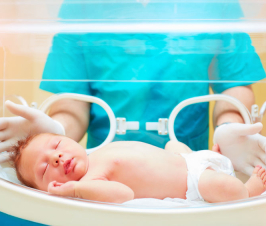In one of my previous articles for the Natural Path, I outlined the essential nutrients expecting mothers should optimize to maintain a healthy pregnancy. Another nutrient that should be added to this list is a molecule called L-carnitine.
L-carnitine
L-carnitine is a molecule made from amino acids lysine and methionine and plays an essential role in our bodies. L-carnitine shuttles long-chain fatty acids in to the mitochondria (the energy producing house of our cells) to be converted in to energy. This process is particularly important when other sources of energy, such as glucose and protein, are not available for use. For this reason, L-carnitine is stored in parts of the body that require the most energy such as the skeletal muscle and the heart. Only 1/4 of L-carnitine is made by the body (liver, kidneys, brain and placenta) while the remaining 3/4 is solely dependent on dietary sources such as red meat, and breast milk for babies.
Optimal levels of L-carnitine
Optimal levels of L-carnitine in newborns is essential as fats are an important source of energy for infants right after birth. During labour, main sources for quick energy such as glucose are used up, leaving the infant to rely on fats once outside the womb – in fact, 25% of infant brain development is dependent on energy provided from fats.1 Also, the colder environment outside the womb requires newborns to increase their body temperature, a process that is derived from L-carnitine-dependent heat production (called thermogenesis) from brown adipose (fat) tissue. L-carnitine is involved with the production of pulmonary surfactant, a compound produced by the lung required for proper lung inflation and function. Sources of L-carnitine for an infant are provided by the mother through the placenta during pregnancy and through the maternal breast milk after birth. The buildup of L-carnitine stores in the fetus is directly related to time in the womb, so premature infants will have lower reserves of L-carnitine compared to those born full-term.1
L-carnitine stores in expecting mothers are supplied to the fetus, used to move long-chain fatty acids to the growing baby, and shifted in to the breast milk. Based on the important role L-carnitine plays in neonatal development, expecting mothers should be aware of their dietary sources of L-carnitine during pregnancy.
Where to get L-Carnitine
Main sources of L-carnitine come from animals, with red meats such as beef and lamb being the best sources. Poultry, fish and milk are also rich in L-carnitine.2 I typically recommend that pregnant women consume at least 3-6 ounces per week of free-range, grass-fed red meat, in order to easily achieve the essential nutritional requirements for pregnancy (including adequate protein and other important nutrients such as iron, taurine, vitamin B12, and folate). L-carnitine is made from amino acids lysine and methionine, so incorporating foods that contain these amino acids are also an excellent way to ensure proper L-carnitine levels for pregnancy.
Sources of lysine include:
- animal products: eggs, red meat, fish (cod and sardines)
- Parmesan cheese
- beans and legumes
- soy
Sources of methionine include:
- animal products: red meat, turkey, eggs, shellfish, dairy
- soy and nuts (brazil nuts)
The production of L-carnitine requires B-vitamins, so these should be dosed on recommendation by a qualified medical professional – a good prenatal vitamin will provide a healthy amount of B-vitamins.
As many of the dietary sources of L-carnitine (and its building blocks) are derived from animal sources, L-carnitine should be supplemented to those who choose to follow a vegan diet during their pregnancy. Also, certain genetic causes may prevent one from producing L-carnitine. Consult with a qualified medical professional who is familiar with proper dosing and forms of L-carnitine supplementation if you’re concerned about your L-carnitine levels during pregnancy.
 Dr. Tanya Lee, N.D. received her Honours Bachelor of Science degree in Biochemistry and Biomedical Sciences from McMaster University, and was trained as a Naturopathic Doctor at the Canadian College of Naturopathic Medicine. Dr Lee practices full-time between two clinics located in Toronto and Milton Ontario and has been voted Milton’s favourite Naturopath in 2013 and 2014. Her primary care practice focuses on family medicine, treating a wide variety of conditions such as hormonal (endocrine) disorders, fertility, digestive problems, cardiovascular disease, diabetes, insomnia and fatigue. She has a special interest in the treatment of autoimmune diseases, paediatric and perinatal health. Tanya offers her clinical knowledge to a number of publications, including the Natural Path.
Dr. Tanya Lee, N.D. received her Honours Bachelor of Science degree in Biochemistry and Biomedical Sciences from McMaster University, and was trained as a Naturopathic Doctor at the Canadian College of Naturopathic Medicine. Dr Lee practices full-time between two clinics located in Toronto and Milton Ontario and has been voted Milton’s favourite Naturopath in 2013 and 2014. Her primary care practice focuses on family medicine, treating a wide variety of conditions such as hormonal (endocrine) disorders, fertility, digestive problems, cardiovascular disease, diabetes, insomnia and fatigue. She has a special interest in the treatment of autoimmune diseases, paediatric and perinatal health. Tanya offers her clinical knowledge to a number of publications, including the Natural Path.
References:
- Kępka A et. al.The role of carnitine in the perinatal period. Dev Period Med. 2014 Oct-Dec;18(4):417-25
- Pekala J et. al. L-carnitine–metabolic functions and meaning in humans life. Curr Drug Metab. 2011 Sep;12(7):667-78.

















